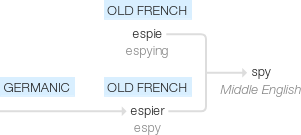Spy
Middle English: shortening of Old French espie ‘espying’, espier ‘espy’, of Germanic origin, from an Indo-European root shared by Latin specere ‘behold, look’.
wiktionary
From Middle English spien, aphetic variant of earlier espien(“to espy”), from Old French espier(“to spy”), from Frankish *spehōn(“to spy”), from Proto-Germanic *spehōną(“to see, look”), from Proto-Indo-European *speḱ-(“to look”). Akin to German spähen(“to spy”), Dutch spieden(“to spy”).
The noun displaced native Old English sċēawere(literally “watcher”), which was also the word for "mirror." In this sense, the verb displaced Old English sċēawian, which was also the word for "to watch" and became the Modern English word show.
etymonline
spy (v.)
mid-13c., "to watch stealthily," from Old French espiier "observe, watch closely, spy on, find out," probably from Frankish *spehon or some other Germanic source, from Proto-Germanic *spehon- (source also of Old High German *spehon "to look out for, scout, spy," German spähen "to spy," Middle Dutch spien), the Germanic survivals of the productive PIE root *spek- "to observe." Old English had spyrian "make a track, go, pursue; ask about, investigate," also a noun spyrigend "investigator, inquirer." Italian spiare, Spanish espiar also are Germanic loan-words. Meaning "to catch sight of" is from c. 1300. Children's game I spy so called by 1946.
spy (n.)
mid-13c., "one who spies on another," from Old French espie "spy, look-out, scout" (Modern French épie), probably from a Germanic source related to spy (v.).
